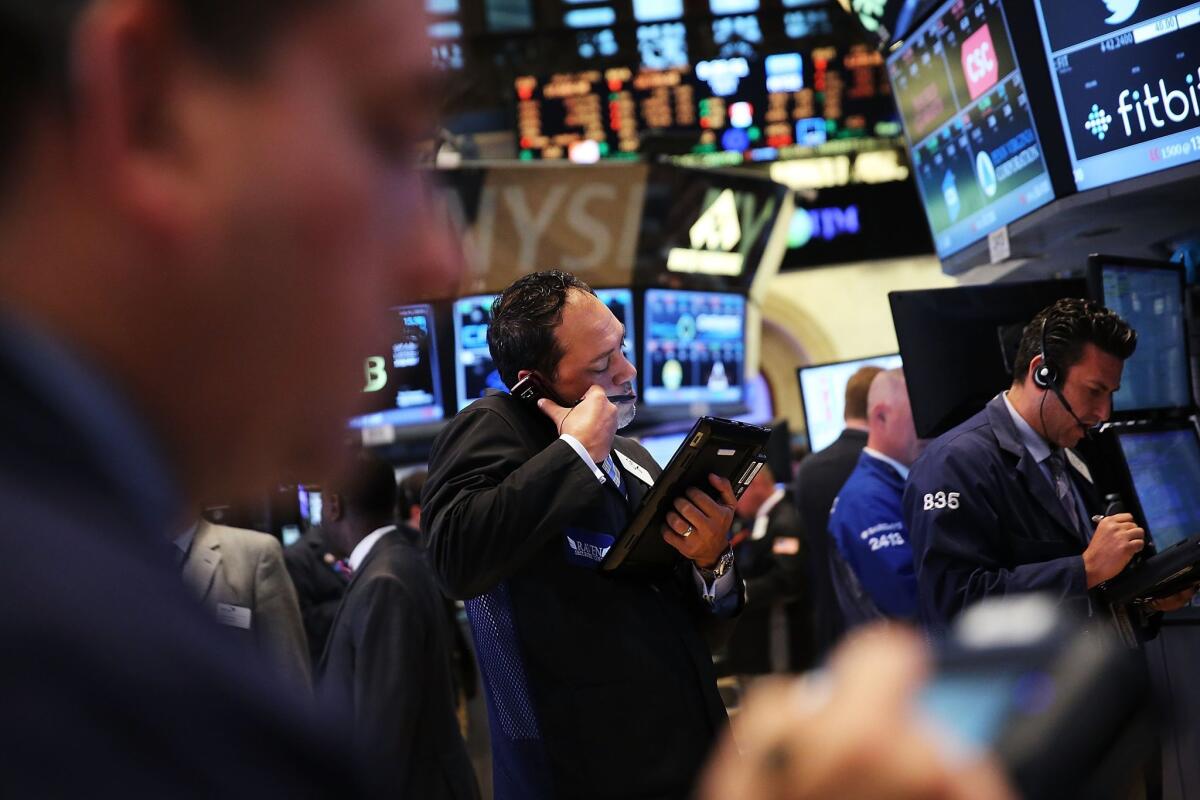Stocks slip and dollar gains against the euro as Greek debt crisis unfolds

Traders work on the floor of the New York Stock Exchange on Monday.
- Share via
U.S. stock prices slipped and the dollar edged higher against the euro Monday as investors watched warily to see if Greece’s financial crisis worsens.
Prices of U.S. Treasury bonds also rose as traders sought safer places to invest while the Greek debt saga keeps unfolding.
But crude-oil prices plummeted 7% toward a three-month low as the dollar’s strength — oil is priced in dollars worldwide — added to other factors weighing on oil markets.
U.S. markets reopened after a three-day holiday weekend to observe Independence Day and after Greeks voted Sunday to reject creditors’ terms for that country’s latest bailout package.
The referendum vote heightened fears that if Greece can’t reach terms on structuring its heavy debt, its banking system could collapse and bring Greece closer to leaving the 19-nation Eurozone, the block of nations using the euro as their currency.
The vote rattled European stock markets, where key indexes fell from 1.5% to 4%. But the reaction was more muted on American markets, where benchmark indexes lost less than 0.5%.
The Dow Jones industrial average fell 46.53 points to 17,683.58, the Standard & Poor’s 500 index lost 8.02 to 2,068.76 and the Nasdaq composite index dropped 17.27 to 4,991.94.
Greece’s finance minister, Yanis Varoufakis, resigned under government pressure one day before European leaders plan to hold an emergency meeting in Brussels to deal with the Greek crisis.
Greece, whose banks remained closed, later named economist Euclid Tsakalotos as its new finance minister. And Greece plans to unveil new bailout proposals to its European partners at Tuesday’s meeting, government sources told the Los Angeles Times.
Michael Buchanan, deputy chief investment officer for Pasadena-based Western Asset Management Co., said there was some uncertainty among investors early Monday but that “the market has held up reasonably well.”
“The good news is investors have had time to manage their exposure to Greece,” he said. “We’ve been talking about Greece since before 2011.”
The potential for Greece’s problems to rattle the markets certainly remains. A week ago the crisis helped send the Dow Jones industrial average down 350 points, or nearly 2%, in one session.
Mostly, though, “from an individual investor viewpoint I don’t think it has a huge impact, and that’s why we saw the markets shrug that off” Monday, said Jerry Braakman, chief investment officer at First American Trust in Santa Ana.
The markets’ stability also reflects expectations that the European Central Bank would be able to “limit contagion” in the European bond market if necessary, said Blaise Antin, managing director and head of sovereign research at the investment firm TCW Group in Los Angeles.
The Greek crisis “has been a slow-developing train wreck, so people have been positioning their portfolios,” he said.
In the U.S. bond market, prices rose as the yield on the 10-year Treasury note fell to 2.29% from 2.38%.
And in foreign-exchange trading, the euro fell 0.48% against the dollar to $1.106.
The dollar’s gain helped send the price of benchmark light, sweet crude oil for August delivery down $4.17 to $52.76 a barrel on the New York Mercantile Exchange.
“The main catalyst here is Greece,” said John Saucer, an analyst with the energy advisory firm Mobius Risk Group in Houston. “Any time you see the dollar appreciate versus the euro it has a negative impact on dollar-denominated commodities like oil.”
Oil already was under pressure for other reasons, including the potential for Iran oil exports and reports that Saudi Arabia and some other nations in the Organization of Petroleum Exporting Countries boosted production in June, Saucer said.
More to Read
Inside the business of entertainment
The Wide Shot brings you news, analysis and insights on everything from streaming wars to production — and what it all means for the future.
You may occasionally receive promotional content from the Los Angeles Times.












